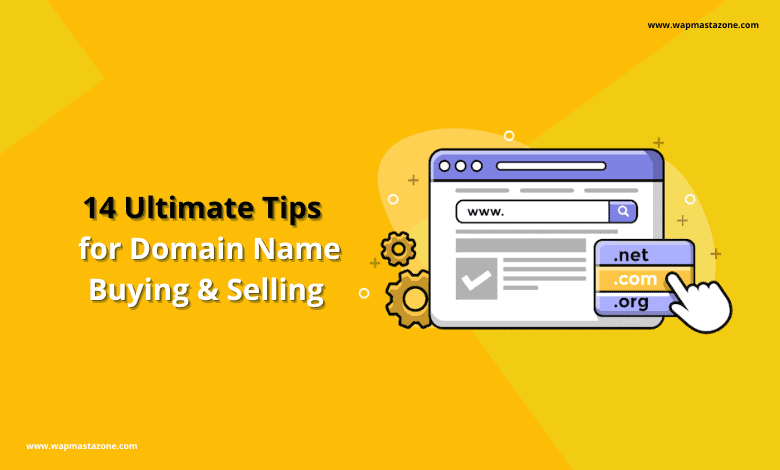
Is Domain name selling still profitable? Can you still buy and sell a domain name for a profitable price? Yes, you can. Domain names have become a valuable commodity in the digital world. They are used to identify websites and businesses and can be bought and sold for significant sums of money. If you’re looking to buy or sell a domain name, it’s important to understand the market and the factors that affect the value of a domain. Here are 14 tips for buying and selling domain names.
Suggested read: Complete Guide to Domain Flipping
14 Ultimate Tips for Domain Name Flipping
1. Research the Market:
Before buying or selling a domain name, it’s important to research the market. Look for recent sales of similar domain names and try to get an idea of what prices are currently being paid. Use tools such as GoDaddy’s Domain Name Value & Appraisal tool to get an estimate of the value of a domain name.
2. Narrow your Domain Research:
It is rather better to narrow your down when doing domain research. Doing this will allow you to easily filter and find a potential domain name. It is also better to focus on “.com” domain extension because it is the most popular with the highest potential of selling.
Take for instance, “.com or .io” domain name that works fine in the areas of technology and AI.
So, if you plan to buy and resell it, then narrow your focus, then do a domain name search using popular or related keywords.
3. Choose a Good Domain Name:
When buying a domain name, it’s important to choose a good name. A good domain name should be short, memorable, and easy to spell. It should also be relevant to the business or website it represents. Avoid using hyphens or numbers in the domain name, as this can make it harder to remember. Find and choose domain names that would eventually offer value to the buyer.
Also read: How to Find Domain Names
4. Consider the Domain Extension:
When buying a domain name, consider the domain extension. The most popular domain extension is .com, but there are many other extensions to choose from, including .net, .org, and country-specific extensions such as .co.uk. The extension you choose should be relevant to the business or website it represents.
5. Check Domain Availability:
You can start first by using domain search or domain generator like domainlista.com to check for domain availability. You can also check on a domain registrar like Godaddy, Namecheap, Namesilo, hostgator, bluehost, hostinger.
6. Check the History of the Domain Name:
Now that you have found a potential domain, it is important to do a background check and look into the history of the domain. Doing this will let you know what the domain has been used for. One popular tool you can use to do this is Wayback Machine.
It is also recommended that you check the domain’s spam score if the domain has already been used in the past.
Also read: Ultimate Guide to Domain Backorder
7. Choose the Right Registrar:
A domain name registrar is a company that manages the reservation of Internet domain names. A registrar operates in accordance with the guidelines of the designated domain name registries. I recommend the following domain registrars Godaddy, Namecheap, Namesilo, hostgator, bluehost, hostinger.
8. Protect Your Personal Information:
Protection of your personal information is also important when buying or selling a domain name. Ensure to activate domain privacy so that your contact information is prohibited from the public. This practice will prevent spammers and scammers from contacting you or hijacking the domain.
9. List your Domain on market place:
How do you sell a domain name Now that you have bought and secured it? you should then decide if you want to list the domain for instant flipping or if you want to keep it for the long term. If you wish to flip the domain instantly, then you should consider placing a “buy now” reasonable price on it, this will attract buyers who see value in the domain and may perhaps wish to resell it or use it for business purposes.
You can list and sell or flip your domain name on the following platforms;
Suggested read: Domain Auction and Domain Bidding Process
10. Contact potential buyers:
While the aforementioned is a means of selling or flipping the domain, you can also explore other options which include reaching out to potential buyers through email or phone calls and letting them know the value of the domain and why they should buy it.
Be precise in your mail and give them options in the event they don’t make an instant decision.
11. Negotiate the Price:
Depending on the platform or means you are using to sell the domain name, negotiation may help you sell for a higher price. For instance, if you list the domain name and set the pricing to “minimum offer”, this will give room for negotiation between you and the buyer. In the event that domain brokers are doing the job on your behalf, it is mostly like they would also negotiate for a higher price so that they can also make some profit.
Also read: 6 Reasons Why you Should buy a Custom Domain
12. Use a Domain Broker:
If in case you do not wish to participate in the negotiation process, then the domain registrar where you list your domains also has domain brokers who can do the job on your behalf and all you have to do is relax and get your money once the transaction is completed. Also, note that you will need to activate fast transfer for the domain in this case.
13. Transfer the Domain Ownership Properly:
When selling a domain name, ensure you transfer the domain ownership properly so that it gets to the right owner. You may consider using a domain escrow service to ensure that the transaction is safe and secure. This will protect both the buyer and the seller and ensure that the domain is properly transferred without any of the parties feeling threatened.
14. Follow the Market Trends:
Apparently, the domain industry has become a gold mine and the hunt for new and expired domains has not stopped. So, ensure to stay active and follow the market trends if you want to catch potential domain names that you can resell. There are many automation tools that you can also use in order to narrow down your search. This will help you make informed decisions.
Also read: The Domain Expiration Process



